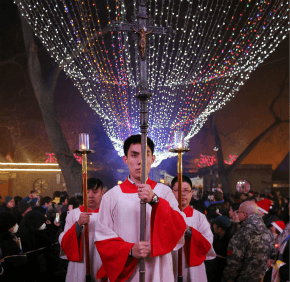By Catholic News Service
HONG KONG – When Chinese Minister of Housing Chen Zhenggao traveled to bustling Yiwu in mid-October, news reports said he told housing and law enforcement officials to “battle against illegal constructions” by learning from Zhejiang.
Zhejiang has used the pretext of illegal building to bulldoze churches and remove their crosses. By Christmas 2014, reports said 500 churches had been targeted in the province. By this past Christmas, the number had exploded to more than 1,500, reported ucanews.com.
After claiming 2014 to be the worst year for religious persecution in China since the Cultural Revolution, observers in and outside the country say this year saw the situation deteriorate further. Relations between China’s faithful and the Communist Party have not been this strained since the days of Chairman Mao.
In Tibetan monasteries, monks and nuns complained the Communist Party is interfering more in daily life than it has for years. In Xinjiang, burqas were banned; so too was “terrorist clothing.”
“Authorities have lost the hearts of the people after the cross-removal campaign,” said a former Catholic journalist in Zhejiang who gave only her Christian name, Clare.
Although authorities succeeded in forcing churches to display less-conspicuous crosses in Zhejiang, few doubt the provincial government’s campaign has achieved anything except harden Christian resolve, let alone curb an appetite for evangelism.
“It helped unite all the clergy to fight for their rights,” said John, a catechist in Wenzhou.
As the cross-removal campaign reached a crescendo midyear, ordinary Christians and priests took to social media to announce a campaign making minicrosses, and bishops took the rare step of publicly denouncing authorities.
With the campaign winding down in Zhejiang, Christians say they now face something even worse: the cross-removal campaign was all about controlling the church facades, but in recent weeks authorities have interfered inside churches.
In Wenzhou, Christians reported state officials attending church on Sundays to silence critical voices. In other areas of Zhejiang, authorities put up propaganda notices on church pin-boards, according to state media. This is all part of a new campaign called “five entries and transformations,” which aims to make churches more Chinese – and by default less foreign – while picking and choosing Bible verses that correlate to party doctrine.
Ucanews.com reported that some estimates put the number of Christians in China at more than 100 million, and the Communist Party is attempting to co-opt Christianity to its own political ends. But it remains unclear whether its policy comes from the very center of the party, and therefore whether it will endure, said Fenggang Yang, director of the Center on Religion and Chinese Society at Purdue University in West Lafayette, Indiana.
High-ranking party officials appear to disagree about whether Christianity should adapt to China, or the other way round, he added, and a firm direction won’t be made until a delayed religious meeting led by President Xi Jinping takes place.
Fenggang told ucanews.com the fact that the meeting had been postponed multiple times “is a sign of Xi’s dissatisfaction with the work and direction of religious affairs, and probably a sign of an impasse of internal debates and disagreements.”
For China’s diverse religious communities, the future remains less certain than it has been for many years.
Whatever happens, few Chinese Christians appear hopeful of a reprieve from Xi’s strict, rule-of-law handling of the communist government in 2016. On China’s periphery, minority Tibetan Buddhists and ethnic Uighur Muslims appear even less optimistic.
This year started with an official ban on burqas in Xinjiang, then in May Beijing extended what is in effect a state of emergency following a series of attacks.
Stricter measures have seen the first mass trials in China in 20 years and thousands of additional troops deployed in cities, including Urumqi.
Alarmed by a series of attacks blamed on Uighurs and recent violence overseas by the Islamic State group, which released its first call to arms in Mandarin in December, the Chinese government has pushed ahead with drafting a new, controversial anti-terror law.
International rights groups acknowledged China needs to tackle a surge in violence in the west of the country, but also warned repeatedly that the draft risks enshrining a vague catch-all to help Beijing target opponents, real and imagined.
In January, authorities in Tibet posted public notices offering rewards of up to 300,000 yuan to informants who tip off police ahead of “violent terror attacks.”
The main targets were vaguely described as “overseas terrorist organizations and their members’ activities inside China and those spreading religious extremism.”
In July, police in a Tibetan region of Sichuan province opened fire on protesters demanding the return of the body of spiritual leader Tenzin Delek Rinpoche, who died after nearly 13 years in prison. His conviction and 20-year sentence for a series of bombings in Chengdu in 2002 remains disputed by most Tibetans.
Although his represents the most high-profile case this year, overall more Tibetan monks and nuns were confirmed detained – 31 in 2015 compared to 21 the previous year, according to a tally by London-based Free Tibet.
As Tibet’s spiritual leader, the Dalai Lama, turned 80 in July, Beijing seemed to turn up criticism denouncing his “Middle Way” approach of greater Tibetan autonomy. Then, two weeks after his birthday, a Tibetan delegation returned from Beijing saying more dialogue would soon follow. It had been five years since the previous official talks.
Also see:
National Geographic shutterbug recalls photographing Pope Francis
Jesus is free, salvation cannot be bought, pope says
Copyright ©2015 Catholic News Service/U.S. Conference of Catholic Bishops.


